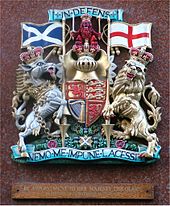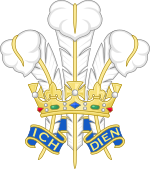Royal warrant of appointment (United Kingdom): Difference between revisions
Gryffindor (talk | contribs) ←Created page with '{{Refimprove|date=August 2010}} {| border=1 align=right cellpadding=4 cellspacing=0 width=220 style="margin: 0 0 1em 1em; background: #f9f9f9; border: 1px #aaaaaa s...' |
(No difference)
|
Revision as of 22:59, 16 January 2011
This article needs additional citations for verification. (August 2010) |
| |||||
Royal warrants of appointment have been issued for centuries to those who supply goods or services to a royal court or certain royal personages. The warrant enables the supplier to advertise the fact that they supply to the royal family, so lending prestige to the supplier. In the United Kingdom, grants are currently made by three members of the British Royal Family to companies or tradesmen who supply goods and services to individuals in the family.
Suppliers continue to charge for their goods and services — a warrant does not imply that they provide goods and services free of charge. The warrant is typically advertised on company hoardings, letter-heads and products by displaying the coat of arms or the heraldic badge of the royal personage as appropriate. Underneath the coat of arms will usually appear the phrase "By Appointment to..." followed by the title and name of the royal customer, and then what goods are provided. No other details of what is supplied may be given.
History
The earliest recorded British royal charter was granted to the Weavers’ Company in 1155 by Henry II of England. [1]
Royal warrant holders

Warrants are currently granted for the Queen, the Duke of Edinburgh and the Prince of Wales. Warrants issued by the Queen Mother automatically expired in 2007, five years after her death.
Some 800 individuals and companies, including a few non-UK companies, hold more than 1,100 warrants to the British Royal Family. Suppliers must have had a trading relationship with an individual in the family for at least five years before they can be considered for a warrant. Warrants are awarded at the discretion of the Lord Chamberlain, acting as the chairman of the Royal Household Tradesmen's Warrants Committee. Warrants are awarded for renewable terms of five years, though they can be revoked at any time; some warrants have been held for more than 100 years. Goods need not be for the use of the grantor. Cigarettes were only bought for the use of guests for example, but these warrants were cancelled in 1999 as a matter of public policy.
Royal warrants are only awarded to tradesmen. The professions, employment agencies, party planners, the media, government departments, and "places of refreshment or entertainment" (such as pubs and theatres) do not qualify.[1]
A directory of royal warrant companies is available at the website of the Royal Warrant Holders' Association.
Features on products and services provided exclusively by royal warrant holders is available at The Royal Purveyors
References
Notes
- ^ a b "The Royal Warrant Holders Association". www.royalwarrant.org. Archived from the original on April 2, 2008. Retrieved 2008-06-02.
Bibliography
- By Appointment: 150 Years of the Royal Warrant and Its Holders, Tim Heald, Queen Anne Publisher (2 Nov 1989), ISBN 0356170993
External links
- Royal Warrants explained on the royal.gov.uk website
- The Royal Warrant Holders Association







